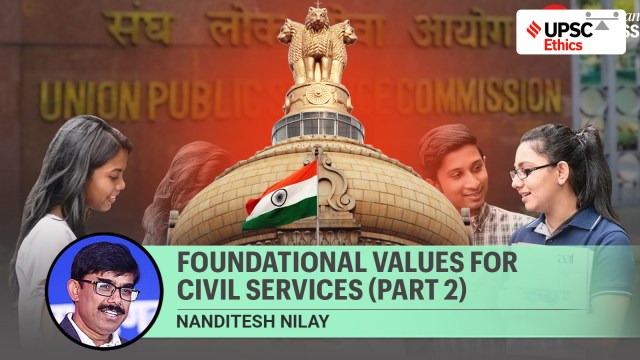UPSC Ethics Simplified | What makes a civil servant ethical?
UPSC Mains Ethics GS 4 : What are the foundational values of civil services? Which cardinal values act as 'Kavach-Kundal' (protective armor), and how do they help fulfill the true purpose of public service? Nanditesh Nilay, our ethicist, discusses.
 What does it mean to be a civil servant with integrity and purpose?
What does it mean to be a civil servant with integrity and purpose? The Indian Civil Service stands as a cornerstone of our democracy, deeply rooted in ethical values that ensure not only efficiency at work but also pave a clear path for service aimed at uplifting the nation, its institutions, and individuals. In this second part on the foundational values of civil services, we continue from where we left off, addressing the question: What does it mean to be a civil servant with integrity and purpose?
The role of values in objective and ethical decision-making
To address the case of objective decision-making, as well as behavioral errors at the macro and micro levels, a civil servant must possess the logical competency which Hegel referred to as a triadic movement, consisting of the dialectic illustration of thesis, antithesis, and synthesis. In such a case, self-knowledge reaches a stage where the subject and object are no longer different or distinct.
Furthermore, to bring objectivity into decision-making, partisanship must be removed. A person must not take any side except the side of ethics, and thus reach a level where impartiality guides the decision-making process. If objectivity means remaining unbiased and being consciously certain or grounded in reason, then impartiality is that transparent conduct which is guided by fairness and equality.
However, such states of reason depend on emotional stability, where the pain and pleasure of the self, as well as others, can be recognized. This can only be exhibited through the value of empathy, which is the highest form of emotional maturity. Ultimately, ethics deals with issues of morality and investigates the standards of moral judgment and the purpose of life. The value of empathy brings a person out of rival positions and prepares them to receive feelings—spoken or unspoken.
Empathy, integrity, and commitment in public service
Often, in a country like India, poor people feel frightened to talk to doctors, teachers, lawyers, bureaucrats, or even strangers. That hesitation and fear in communication have always been observed and remain vivid in public perception. Here, the value of empathy can bring the needed light of humanity, which is expected from those in power—officers who are diligent and astute.
Objectivity, non-partisanship, and empathy are always needed in a democracy like India, where there is a huge gap in the purchasing power of the poor and the rich. Such values are relevant not only at the macro behavioral level but also at the micro, interpersonal level. Practicing these values consistently helps shape healthier personalities and minimizes internal contradictions like ego and inferiority/superiority complexes—especially within the services such as IAS, IPS, IFS, and State administrations.
Values also help public servants build stronger teams, recognize others’ contributions, and speak and act with maturity. For example, in the India-England Test series, more ethical conduct could have avoided naming a single player repeatedly in a press conference. Such restraint is part of ethical leadership.
Ethical values also help in appreciating excellence, even amidst rivalry. That’s why sportspersons like Tendulkar, Federer, or Jannik Sinner become role models—not just for their skill but for their humility. Values protect individuals from ego-driven conduct and promote emotional balance.
Becoming a civil servant with integrity and purpose
By practicing these cardinal values, a person qualifies for the stage of integrity—the quality of having strong moral convictions and the will to abide by them in both professional and personal life. Given the impact a civil servant has on public welfare and resources, integrity becomes non-negotiable. It also enables officers to serve as ethical role models and provide effective leadership.
Integrity naturally leads to commitment, the unwavering dedication to public service goals. Without it, the power or privileges of a position may derail a person from their duties. Commitment ensures that the officer remains focused on societal welfare rather than personal gain.
In all interactions, cardinal values act like Kavach-Kundal (armor), freeing the self from ego and complexities, and evolving a person into their best version. If a civil servant succeeds in building trust, solving problems, promoting inclusion, and spreading peace and positivity, the purpose of public service is fulfilled. And that’s exactly what the last person in a democracy is looking for—that person, that officer, being good.
POST READ QUESTION
How does practicing cardinal values help a person attain integrity, and why is integrity non-negotiable for a civil servant responsible for public welfare and resources?
(The writer is the author of ‘Being Good’, ‘Aaiye, Insaan Banaen’, ‘Kyon’ and ‘Ethikos: Stories Searching Happiness’. He teaches courses on and offers training in ethics, values and behaviour. He has been the expert/consultant to UPSC, SAARC countries, Civil services Academy, National Centre for Good Governance, Central Bureau of Investigation (CBI), Competition Commission of India (CCI), etc. He has PhD in two disciplines and has been a Doctoral Fellow in Gandhian Studies from ICSSR. His second PhD is from IIT Delhi on Ethical Decision Making among Indian Bureaucrats. He writes for the UPSC Ethics Simplified (concepts and caselets) fortnightly.)
Subscribe to our UPSC newsletter and stay updated with the news cues from the past week.
Stay updated with the latest UPSC articles by joining our Telegram channel – Indian Express UPSC Hub, and follow us on UPSC section of The Indian Express on Instagram and X.
For your queries and suggestions write at manas.srivastava@indianexpress.com.
UPSC Magazine

Read UPSC Magazine
- 01
- 02
- 03
- 04
- 05































